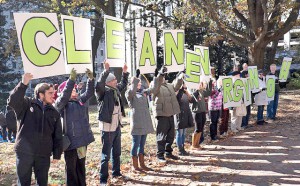As the Virginia General Assembly enters the final days of its 2015 session, we can look back on five intense weeks.
Among the many issues our lawmakers labored over, a few were explosive enough to consistently make headlines. Energy policy was one of those issues thanks largely to electric utilities’ efforts to capitalize on worries about upcoming federal rules on carbon pollution.
Here’s a recap of the drama, along with a few important policies that received less fanfare.
>> First, a measure that shocked newspaper editorial boards, dismayed consumer groups, and stunned many of us who have challenged the utilities’ business-as-usual plans, but passed the legislature easily: under SB 1349, Virginia would see a five-year period when state regulators do not review rates set by Dominion Power and Appalachian Power, likely preventing any refunds of utility over-earnings to customers. The base portion of rates will be fixed, but other charges related to fuel costs can still rise during the period.
Political dynamics and election sensitivities made this legislation especially charged, and ultimately some of our top legislative champions for advancing clean energy stepped in and saw to it that the measure includes a designation for up to 500 megawatts of solar energy to be in the public interest, thereby authorizing state regulators to approve large scale solar farms — of which there are exactly zero in Virginia right now. The champs also added provisions for utilities to pay for low-income home weatherization programs.
Gov. McAuliffe signed the bill into law on Tuesday.
>> Last Wednesday, legislation passed both houses capping Virginia’s coal production and employment tax credits at $7.5 million annually. Appalachian Voices and other advocates have called for comprehensive study of whether such credits have their intended effects, including sustaining coal-related jobs in Southwest Virginia. A study by Downstream Strategies a few years ago suggests they do not. SB 741, which originally extended the tax credits by five years, is expected to come out of conference committee this week extending the credits for only two years while analysis is done by a reform-oriented panel.
>> On to one enormous highlight of the session: several bills containing extreme language against the U.S. Environmental Protection Agency’s proposed Clean Power Plan — aimed at reducing carbon pollution from power plants — never made it out of committee. One was an effort to empower the General Assembly to sue the EPA. Another bill that is still alive directs the state Department of Environmental Quality to consider concerns and take the input of legislators, and requires the General Assembly to express its approval of DEQ’s compliance plan in the form of a resolution.
>> Lastly, a bill based on a central concept of Gov. McAuliffe’s Energy Plan creates a Solar Energy Development Authority for Virginia. In spite of some legislators’ concerns about growing government, the promise of boosting job growth in the solar industry propelled this measure through both houses. A net energy metering expansion bill also still stands a good chance of passing.
With some great concepts like the Virginia Coastal Protection Act unable to find sufficient support in committee to pass this year, the work to pave the way for next year’s legislative efforts lies before us. Citizen contact with delegates and senators can continue year-round, and there are many ways to stay engage.
In addition to calling or writing your elected officials, enrolling in an energy-efficiency program offered by your power company or going solar sends a clear signal to our legislators about Virginia residents’ preferences and expectations on important energy policy issues.




Leave a Reply